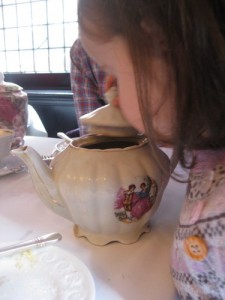March 24, 2013
In the Tree House by Andrew Larsen and Dusan Petricic
 Oh, there is nothing else quite like a tree house. We like to imagine that we live in one, what with the giant trees that cover our house in shade and maple keys, and the squirrels always on the run past our door. But when I was a child, I dreamed of a tree house, a place up a ladder to call my own. I don’t know if it was because I was a girl that all fantasies came with visions of curtains at the windows, but I wanted a tree house regardless, a cool place for summer nights high above my suburban backyard.
Oh, there is nothing else quite like a tree house. We like to imagine that we live in one, what with the giant trees that cover our house in shade and maple keys, and the squirrels always on the run past our door. But when I was a child, I dreamed of a tree house, a place up a ladder to call my own. I don’t know if it was because I was a girl that all fantasies came with visions of curtains at the windows, but I wanted a tree house regardless, a cool place for summer nights high above my suburban backyard.
With everything my parents did right (which was most things), we still do so delight in tormenting them over holiday dinners with recollections of where they failed us and the story topper-most of all of these is the saga of the playhouse plans. For Christmas 1988, we received a set of blueprints for a playhouse that was never ever built. (My dad also backed his car over my bike on more than one occasion, but that’s a story for another day.) In the months that followed that Christmas, we moved to a new city and our nation’s economy fell into recession, two factors that probably played a role in the playhouse’s failure to come into existence. I don’t know what ever happened to those blueprints, but their memory lives on in infamy as a symbol of childhood disappointment, of the hideout we never had. We made do with the basement crawlspace instead, until we grew too tall and started hitting our heads.
And so I was amused to encounter fervid tree house planning in Andrew Larsen’s latest picture book In the Tree House, and even to encounter tree house planning disappointment. A small boy moves to a new house with a big backyard and gets to planning: “I planned tree houses that could turn into flying ships at the flick of a switch./ I planned tree houses with secret slides for quick getaways./ I planned one tree house that had two levels, one for me and one for my brother.” He and his brother put their plans together and show them to their dad who tells them, “When I was a kid, I wanted a tree house more than anything else in the world.” He’d made plans, just like his sons do, but his never came to fruition. And oh, I know exactly how that feels. I’d never seen my own story so expressed in literature before.
Dad gets to work though and builds a tree house with his boys, a fantastic secret space with a view of the entire neighourhood. You can’t see the stars because the city is too bright, but you can see the city, and the city is enough.
But the next summer in the tree house, everything is different. The boy’s brother is far too interested in hanging out with his friends to partake in tree house things. “So now I’m the king of the castle,” the boy explains. “I can do whatever I want up here.” I point to the illustration of the boy, his chin resting on his hand, his mournful expression. “Do you think he likes being king?” I ask Harriet. “No,” she answers. “He’s lonely.”
When one night a blackout casts the city into darkness though, everything is different though if only for a little while. The neighbours emerge from their houses and urgently seek community assistance in the consumption of melting ice cream. They share candles and flashlights, observed by the boy up in his tree house whose brother has come to join him. For one magical evening, the neighbourhood is alive, and the boy realizes that his brother is fundamentally the same person he always was, that some elements of their relationship will stay the same no matter what else is changed, but also that nothing lasts forever. Childhood magic is as fleeting as a summer night, moments to be savoured while they’re here.
Because the lights come on again, but the story ends with one of Dusan Petricic’s fantastic illustrations, the two boys silhouetted up in the tree together, watching the whole world twinkling below them.
March 21, 2013
Good Things
 A few weeks ago, when everything seemed really terrible, I discovered that Kawartha Dairy Ice Cream was sold by the tub at Bloor Superfresh, and I think that this ice cream has been what’s gotten me through most of March. We’ve tried a few flavours, but nothing has outranked Death by Chocolate. We’re totally addicted, though we’re trying to wean Harriet off the habit. Yesterday we told her dessert was a mango, and we saved our ice cream until after she’d gone to bed.
A few weeks ago, when everything seemed really terrible, I discovered that Kawartha Dairy Ice Cream was sold by the tub at Bloor Superfresh, and I think that this ice cream has been what’s gotten me through most of March. We’ve tried a few flavours, but nothing has outranked Death by Chocolate. We’re totally addicted, though we’re trying to wean Harriet off the habit. Yesterday we told her dessert was a mango, and we saved our ice cream until after she’d gone to bed.
Before I went for my biopsy last week, I had a conversation with a friend who told me that she always rewards herself after unpleasant medical procedures with the reward of being able to eat whatever she wants. This was in an email, and how I laughed and laughed as I read that. “I’m 7 months pregnant and awaiting a biopsy,” I replied. “I eat what I want all the time.” We’re actually on two tubs a week, which is a little excessive, but what can you do? My other craving is for quinoa and asparagus salad, so I think it all balances out.
The wonderful thing about our Kawartha Dairy habit is that it leads to the most delightful shopping excusions. On Sunday, the only items on our shopping list were ice cream and a bouquet of pussy-willows, which is not a terrible way to live a life.
Another good thing is my good fortune to have a sister who can put together a care-package like nobody’s business. Unfortunately, the local squirrels concur. A big box arrived two weeks ago packed with our favourite kind of tea, a variety of creams, soaps and bathy things, chocolate, and stickers for Harriet. It occurred to me then how much things can really matter when more important matters are up in the air–you’re in a bad place, but then you can eat chocolate and have a luxurious hot bath (while reading an Isabel Huggan book, naturally) which doesn’t transport you away from that bad place, but it also doesn’t make the loveliness any less lovely either.
The package, however, with its many scents had proved too much for the squirrels to resist, so they go to it first. When I finally received it, the squirrels had eaten a hole in the side and it was a sorry sight, that brown paper package tied up with…tape. But thankfully the squirrels had left the contents unscathed. I’m not what they were looking for if the reality of the package came up short, but I’m glad it did. Such lovely scented things have never been better enjoyed.
Oh, and other good things have included the moms at Harriet’s playschool who make up one of the nicest communities I’ve ever been a part of. I remember being apprehensive about the school’s cooperative nature back before we started. Surely, I figured, I’m friends already with everybody ever worth being friends with? But the other parents were so welcoming, and lovely, and I’ve so appreciated their support these last few weeks when my mind has been dwelling in less than fun places. These women have expressed concern, offered generously to help us out, and have been there for me to talk to (and cry to, on one particularly difficult day). Their goodness has made all the difference in the world.
And there are also wonderful books to read (I am reading this one now and it’s amazing); our new bed that is so comfortable, I spend the day counting down until I can get back in it; brunch guests who bring enormous boxes from Clafouti; good things in the post; reading Ramona the Pest at bedtime; hot baths; one of those playschool Moms who gave me a big bag of maternity clothes that aren’t ugly; our fantastic midwives; that I’ve got really good parents; friends who call/write/email; crocuses up across the street; that whole week we went without winter boots; strangers who email to tell me everything will be okay; when our fetus dances to I Got You by Split Enz; and that the strangers were very likely right.
Everything is probably going to be okay, and even if it isn’t, isn’t it more than a little okay already?
March 21, 2013
Roost by Ali Bryan
 The first thing you need to know about this book whose blurb promises “laugh out loud funny” is that I really did. The first time it happened, I was in the bathtub (where I am often found these days), where the acoustics amplified my hysterics in a fashion most disturbing for the rest of my household. The triggering line was, “I even tried to remind her that you borrowed her pants.”
The first thing you need to know about this book whose blurb promises “laugh out loud funny” is that I really did. The first time it happened, I was in the bathtub (where I am often found these days), where the acoustics amplified my hysterics in a fashion most disturbing for the rest of my household. The triggering line was, “I even tried to remind her that you borrowed her pants.”
The second thing is that once I’d finished reading this book, I wasn’t done with it yet. It’s a light and funny read, not necessarily what you’d imagine might resonate, but then I found I kept bringing it up in conversation. “That happened in Roost!” I’d exclaim. My kid would do something funny and I’d shake my head: “Just like Roost!” I’d say.
And the third thing was that when my husband finished reading Fahrenheit 451 the other day and didn’t know what to read next, I put Roost into his hands, that book I kept talking about. He started laughing out loud way earlier on than I did, and I’m enjoying that he’s enjoying it so much.
It’s a hard (and rare) balance to strike, a book that is as funny as it is smart, and I find this can be particularly the case with books by and about women, partly because critics tend to judge the concerns of womanhood as insubstantial anyway and also because writers do have a tendency to bring forth humour at the expense of their female protagonist’s strength and intelligence–see “And the trouble(?) with comic heroines”.
But Ali Byran gets it right in Roost, her first novel, the story of of Claudia who would have failed as a domestic goddess, if she’d ever thought about being a contender. She works full time, is the single mom of two kids whose irrepressible spirits are exhausting to behold, and has the example of her brother’s perfect family to compare her own to whenever she’s required to feel inadequate, which is often.
The dynamics shift though when Claudia’s mother suddenly dies, and the hapless Claudia is left to pick up the pieces of her extended family by sole virtue of being the daughter. Her father as a widow is faring disastrously, her brother is consumed by his wife’s own problems (post-partum depression, for which he has zero understanding or sensitivity), and things around her own home are as chaotic as ever. Moreover, her ex-partner is beginning to resist being at Claudia’s beck and call, and she sees that her reliance upon him for support is going to have to change.
Roost is funny for its frank portrayal of domestic life, in the tradition of Erma Bombeck or Jonathan Franzen in The Corrections. Claudia’s kids are wonderfully realized and irritatingly present in true toddler fashion, nonsensical, so weird, sticky and lovable. But this novel is more than that: Claudia herself is fantastically real as well, and fittingly, “mother” is only one dimension of her identity. Bryan is in command of her material, sometimes unbelievably–I loved when Claudia on a business trip ends up with someone else’s suitcase, ends up wearing the clothes inside out of desperation, except they’re maternity clothes. This all could been gone terribly wrong, been much more silly than meaningful, but Bryan makes it work, and the scene where Claudia and the suitcase owner finally connect, the ever-awesome Claudia stepping up with emergency lactation consulting, was incredibly moving (and funny, of course).
What I love best about this novel is that nobody ever changes. There is no great revelations. Claudia’s brother is still the jerk he was when the novel began, there is no fix for her father’s heartache, and even Claudia begins to see that her ex is moving away into a life of his own. But all the same, it’s okay, or it’s going to be. This is not a How the Failed Housewife Learned to Get Along With the Vacuum kind of tale, but instead it’s about how Claudia learns to draw on her reserves, that herself exactly as she is has the capacity to roll with the punches better than anyone else. When life is messy, bumpy and hard, it’s because that’s what life is, and not because you’re doing it wrong.
March 19, 2013
Going Postal with Picture Books
(This post is cross-posted over at Bunch!)
It’s a widely known fact that I am a postal enthusiast, that the delivery of the mail is the focal point of my day, and that I am eternally delighted by books in the post. But just as much am I thrilled when the post turns up in books–I loved Kyo Maclear’s The Letter Opener, and also epistolary books like 84 Charing Cross Road and the Burleigh Cross Postbox Theft. And I love encountering all things postal in kids’ books as well, in particular because it helps inspire postal enthusiasm in my daughter (who has had a pen pal since she was 2, of course). Here is a list of a few of our favourites that we’ve encountered lately.
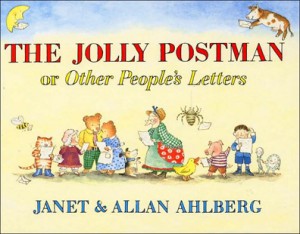 The Jolly Postman by Allan and Janet Ahlberg: I know, I know, you’ve read this one already, but any book by the Ahlbergs never gets old. It’s the perfect union of all the things I love: postal themes, bookishness, fairy tales and nursery rhymes, and amazingly well-produced books with meticulous attention to detail. Follow the Jolly Postman on his round as he drinks cup after cup of tea, and provides intimate glimpses into the lives of familiar characters we only thought we knew.
The Jolly Postman by Allan and Janet Ahlberg: I know, I know, you’ve read this one already, but any book by the Ahlbergs never gets old. It’s the perfect union of all the things I love: postal themes, bookishness, fairy tales and nursery rhymes, and amazingly well-produced books with meticulous attention to detail. Follow the Jolly Postman on his round as he drinks cup after cup of tea, and provides intimate glimpses into the lives of familiar characters we only thought we knew.
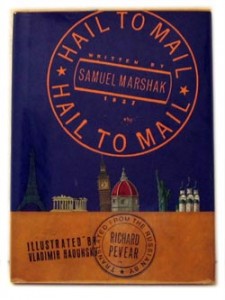 Hail to Mail by Samuel Marshak and Vladimir Radunsky: The mailman delivers a certified letter for Mr. John Peck of Schenectady, only to discover that he’s just left town. The postal-system is ever-reliable, however, and its workers are determined to track John Peck on his round-the-world trip in an effort to get the letter into his hands. The story ends right back where it began, Marshak’s verse and Radunsky’s stylized illustrations making for a remarkable journey.
Hail to Mail by Samuel Marshak and Vladimir Radunsky: The mailman delivers a certified letter for Mr. John Peck of Schenectady, only to discover that he’s just left town. The postal-system is ever-reliable, however, and its workers are determined to track John Peck on his round-the-world trip in an effort to get the letter into his hands. The story ends right back where it began, Marshak’s verse and Radunsky’s stylized illustrations making for a remarkable journey.
 I Miss You Every Day by Simms Taback: Taback is a Caldecott-winner and his talent shines through in this picture book, which was inspired by the Woody Guthrie song “Mail Myself to You.” In Taback’s story, a little girl imagines mailing herself to a far-away friend. The illustrations are whimsical and attractive to children, and I particularly love the gallery of imaginary stamps on the book’s back cover.
I Miss You Every Day by Simms Taback: Taback is a Caldecott-winner and his talent shines through in this picture book, which was inspired by the Woody Guthrie song “Mail Myself to You.” In Taback’s story, a little girl imagines mailing herself to a far-away friend. The illustrations are whimsical and attractive to children, and I particularly love the gallery of imaginary stamps on the book’s back cover.
 Bunny Mail by Rosemary Wells: I really am fascinated by the weirdness of Rosemary Wells’ books–there is more to Max and Ruby than simple bunny-cuteness. In Bunny Mail, Ruby sends invitations to a 4th of July picnic while Max writes to Santa (via Grandma) expressing desire for red motorcycle. Except that Max can’t write, so Max’s letters are mostly composed of tire track, but no matter–Grandma figures it out. And little hands will enjoy lifting the flaps to “read” what Max and Ruby’s letters say.
Bunny Mail by Rosemary Wells: I really am fascinated by the weirdness of Rosemary Wells’ books–there is more to Max and Ruby than simple bunny-cuteness. In Bunny Mail, Ruby sends invitations to a 4th of July picnic while Max writes to Santa (via Grandma) expressing desire for red motorcycle. Except that Max can’t write, so Max’s letters are mostly composed of tire track, but no matter–Grandma figures it out. And little hands will enjoy lifting the flaps to “read” what Max and Ruby’s letters say.
 Dear Tabby by Carolyn Crimi, illustrated by David Roberts: Oh, it’s a familiar trope, the alley-cat turned advice columnist. We loved this book about a scrappy cat who receives letters from all manner of pets–embarrassingly-pampered felines, talkative birds, dissatisfied hamsters, and lonely skunks. With her no-nonsense approach, Tabby D. Cat sets these creatures straight, though the book’s ending reveals that Tabby’s taking care of herself as well. Points also to this book for involving something called “The Dingaling Sisters’ Travelling Circus”.
Dear Tabby by Carolyn Crimi, illustrated by David Roberts: Oh, it’s a familiar trope, the alley-cat turned advice columnist. We loved this book about a scrappy cat who receives letters from all manner of pets–embarrassingly-pampered felines, talkative birds, dissatisfied hamsters, and lonely skunks. With her no-nonsense approach, Tabby D. Cat sets these creatures straight, though the book’s ending reveals that Tabby’s taking care of herself as well. Points also to this book for involving something called “The Dingaling Sisters’ Travelling Circus”.
 Where Do You Look? by Nell Jocelyn and Marthe Jocelyn: While not strictly a postal book, I was thrilled to find a bit of mail in this brand new offering by the remarkable Jocelyn team with their amazing collage illustrations. “Where do you look for a letter?” the text asks against a fantastic airmail envelope background. “In the mailbox?” (with an image of a child posting said envelope in a red mailbox), “Or on the page?” (with the alphabet spilled across a two-page spread in haphazard fashion). Like all the best books, Where Do You Look? challenges any ideas of the world being a simple place (or language being simple to comprehend) and adds texture to the way its reader sees the world.
Where Do You Look? by Nell Jocelyn and Marthe Jocelyn: While not strictly a postal book, I was thrilled to find a bit of mail in this brand new offering by the remarkable Jocelyn team with their amazing collage illustrations. “Where do you look for a letter?” the text asks against a fantastic airmail envelope background. “In the mailbox?” (with an image of a child posting said envelope in a red mailbox), “Or on the page?” (with the alphabet spilled across a two-page spread in haphazard fashion). Like all the best books, Where Do You Look? challenges any ideas of the world being a simple place (or language being simple to comprehend) and adds texture to the way its reader sees the world.
 The Stamp Collector by Jennifer Lanthier and Francois Thisdale: This book only came out last Fall, but has already won a ton of acclaim in Canada and in the US. It’s the story of two boys growing up in China whose paths cross in an unlikely fashion. One discovers a postage stamp on a scrap of paper, and becomes conscious of a world beyond his own. The other becomes a writer whose ideas challenge the government and lead to him becoming a political prisoner. While in prison, the writer is sent letters through the PEN Writers In Prison Program, which are intercepted by prison guards. One of these guards is the stamp-collecting boy, now grown, who takes notice of these letter arriving from all over the world and establishes a relationship with their recipient. It’s a dark story, but one that’s leavened by Thisdale’s beautiful illustrations, the suggestion of a hopeful ending, and the fact that proceeds from the book’s sales are being donated to PEN Canada.
The Stamp Collector by Jennifer Lanthier and Francois Thisdale: This book only came out last Fall, but has already won a ton of acclaim in Canada and in the US. It’s the story of two boys growing up in China whose paths cross in an unlikely fashion. One discovers a postage stamp on a scrap of paper, and becomes conscious of a world beyond his own. The other becomes a writer whose ideas challenge the government and lead to him becoming a political prisoner. While in prison, the writer is sent letters through the PEN Writers In Prison Program, which are intercepted by prison guards. One of these guards is the stamp-collecting boy, now grown, who takes notice of these letter arriving from all over the world and establishes a relationship with their recipient. It’s a dark story, but one that’s leavened by Thisdale’s beautiful illustrations, the suggestion of a hopeful ending, and the fact that proceeds from the book’s sales are being donated to PEN Canada.
http://www.youtube.com/watch?v=uP_d2hBE8vg
March 17, 2013
Pickle Me This Golden Giveaway! The New Baby (Vintage!)
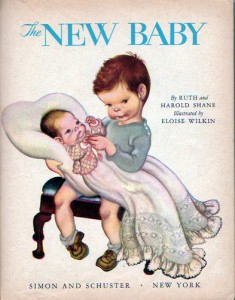 So all this Golden-mania started about a month ago when I discovered that my favourite book from childhood had been published in an earlier edition. I ordered a copy of the 1948 edition of The New Baby by Ruth and Harold Shane, and Eloise Wilkin (though it turned out to be a 1955 reprint, but close enough), but before it arrived, I received another copy from my Aunt in British Columbia who was quite excited that I was going on about a book that she’d had sitting on her shelf for years. So in the end, we’re left with two copies of The New Baby, and I’d love to give our extra one away to a Pickle Me This reader.
So all this Golden-mania started about a month ago when I discovered that my favourite book from childhood had been published in an earlier edition. I ordered a copy of the 1948 edition of The New Baby by Ruth and Harold Shane, and Eloise Wilkin (though it turned out to be a 1955 reprint, but close enough), but before it arrived, I received another copy from my Aunt in British Columbia who was quite excited that I was going on about a book that she’d had sitting on her shelf for years. So in the end, we’re left with two copies of The New Baby, and I’d love to give our extra one away to a Pickle Me This reader.
We’ll be keeping my Aunt’s book, with its inscription in my grandmother’s handwriting (and also because it has more pages/illustrations than the other copy, and features the bizarrrely hovering baby at the end). But the other book is still pretty good, featuring haggard, mumpish Aunt Pat with her chicken legs, the seemingly unpregnant Mommy who is due to deliver in days but must have fastened her girdle tight, and Daddy with his ever-present pipe. It’s a weird book, but kids don’t really seem to notice, or at least mine doesn’t. If there is a new baby coming into your lives soon, this book might serve your family well, and even if there isn’t.
If you’d like to be entered in a draw to win our extra copy, just leave a comment on this post before the end of Friday March 22. Canadian addresses only please. We’ll pick a winner and I’ll pop it in the post next weekend. Because really, there is nothing better than books in the post, is there?
Update: Congratulations to Carrie, whose name was chosen by Harriet in a draw, fittingly picked out of a book bag from the Obsborne Collection of Children’s Books.
March 17, 2013
Golden Legacy by Leonard Marcus
 I loved Leonard Marcus’ Golden Legacy as much as I imagined that I would. It traces the history of Golden Books and shows the changes and innovations in children’s publishing over the 20th century, and how much of a break Golden Books truly were from tradition. They were books about children’s lives in the here and now, and the world around them, which brought about the scorn of librarians who felt that children’s stories should have their roots in fairy tales and archetypal stories. Though it’s also easy to see why the librarians found it hard to be invested in Golden Books: Golden was a printer before it was a publisher, and while the quality of many of its books is hard to deny, the company’s bottom-line was always mass production and keeping costs low. Further, their writers and artists weren’t well-compensated, and their licensing agreements with Disney and the like didn’t necessarily make for great literature.
I loved Leonard Marcus’ Golden Legacy as much as I imagined that I would. It traces the history of Golden Books and shows the changes and innovations in children’s publishing over the 20th century, and how much of a break Golden Books truly were from tradition. They were books about children’s lives in the here and now, and the world around them, which brought about the scorn of librarians who felt that children’s stories should have their roots in fairy tales and archetypal stories. Though it’s also easy to see why the librarians found it hard to be invested in Golden Books: Golden was a printer before it was a publisher, and while the quality of many of its books is hard to deny, the company’s bottom-line was always mass production and keeping costs low. Further, their writers and artists weren’t well-compensated, and their licensing agreements with Disney and the like didn’t necessarily make for great literature.
Marcus’s Golden history is extensive, and interesting, though I’ll admit I didn’t read it with a great attention to detail and the corporate history of Golden was a bit hard to follow. But I kept turning the pages because his profiles and biographies of Golden artists and writers were fascinating, and because every other page brought back a memory from my childhood, an image from a familiar book that I’d forgotten ever encountering. Golden Legacy is a pleasure to leaf through, a trip down memory lane, even if, like me, your Golden years weren’t even the most golden of Golden.
Do you remember running your finger along the train on the back of a Golden Book, encountering each character so familiar from stories read over and over again? On my daughter’s bookshelf are Golden Books that belonged to my mother when she was a little girl, and they don’t seem dated, even through the daddies are all smoking pipes and pot-bellied stoves are warming rooms. Harriet received I Can Fly as a gift from our friend Erin when she was very small, a brand new Golden Books whose words and illustrations are so vibrant that I never realized the book had been created by Ruth Krauss and Mary Blair more than sixty years ago. And we’ve read Scuffy the Tugboat over and over again, but then who hasn’t?
Like the last time I read a book by Leonard Marcus, reading this one has served to expand my literary universe. Suddenly there is a whole host of books and authors to seek out for the first time, as well as a long list to revisit. And Golden Legacy itself with be a book I’ll be revisiting over and over again.
March 16, 2013
March Break Delights
 This week was our first March Break, which turned out to be legendarily good thanks to Stuart taking the week off too. It’s funny how spending a week with my child and another adult is a vastly superior prospect to just kid and me. We had a very wonderful time and were careful to never travel too far from home. We took care too to spend a lot of time hanging around doing nothing, which isn’t to say that we didn’t get up to some excellent adventures. We are also very pleased to have achieved our goal of going out for lunch every single day.
This week was our first March Break, which turned out to be legendarily good thanks to Stuart taking the week off too. It’s funny how spending a week with my child and another adult is a vastly superior prospect to just kid and me. We had a very wonderful time and were careful to never travel too far from home. We took care too to spend a lot of time hanging around doing nothing, which isn’t to say that we didn’t get up to some excellent adventures. We are also very pleased to have achieved our goal of going out for lunch every single day.
 Sunday was our trip to the Maple Sugar Bush, which was sweet and sunshiney. Monday we decided to go crazy and visit the library (it’s true! I know we sound reckless and wild, but it’s just the way we are) which was fun because Stuart doesn’t usually get to come on our weekly visits. And then we had lunch at Caplansky’s Deli, because all the experts say that pregnant women should ingest giant mountains of smoked meat.
Sunday was our trip to the Maple Sugar Bush, which was sweet and sunshiney. Monday we decided to go crazy and visit the library (it’s true! I know we sound reckless and wild, but it’s just the way we are) which was fun because Stuart doesn’t usually get to come on our weekly visits. And then we had lunch at Caplansky’s Deli, because all the experts say that pregnant women should ingest giant mountains of smoked meat.
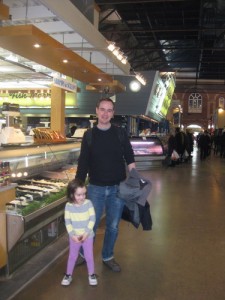 On Tuesday, we had lunch at the new Montreal-style bagel place in Kensington Market, which is so so delicious, and then we walked to the Allan Gardens Conservatory to see palm trees and cacti and other green things. Wednesday morning was devoted to having holes poked in my neck, but things got better afterwards. We had lunch at Fanny Chadwicks (our favourite local joint) and then spent the afternoon on the couch watching Pete’s Dragon.
On Tuesday, we had lunch at the new Montreal-style bagel place in Kensington Market, which is so so delicious, and then we walked to the Allan Gardens Conservatory to see palm trees and cacti and other green things. Wednesday morning was devoted to having holes poked in my neck, but things got better afterwards. We had lunch at Fanny Chadwicks (our favourite local joint) and then spent the afternoon on the couch watching Pete’s Dragon.
 On Thursday, we visited the Textile Museum of Canada (with our free MAP pass) to see the Marimekko Exhibit, whose designs are right up my alley. (I got a Marimekko scarf!). And then we had lunch at St. Lawrence Market, pure deliciousness. We also visited the Market Gallery and picked up a print of I is for Island Ferry to hang on our wall. And then Harriet had a meltdown because we wouldn’t buy her a painting of horses, and cried on the streetcar all the way home (which everyone else found absolutely charming). Later that afternoon, Harriet cheered up and we all visited the midwives, and were thrilled to hear our baby’s heartbeat and to have it confirmed that Baby is growing well.
On Thursday, we visited the Textile Museum of Canada (with our free MAP pass) to see the Marimekko Exhibit, whose designs are right up my alley. (I got a Marimekko scarf!). And then we had lunch at St. Lawrence Market, pure deliciousness. We also visited the Market Gallery and picked up a print of I is for Island Ferry to hang on our wall. And then Harriet had a meltdown because we wouldn’t buy her a painting of horses, and cried on the streetcar all the way home (which everyone else found absolutely charming). Later that afternoon, Harriet cheered up and we all visited the midwives, and were thrilled to hear our baby’s heartbeat and to have it confirmed that Baby is growing well.
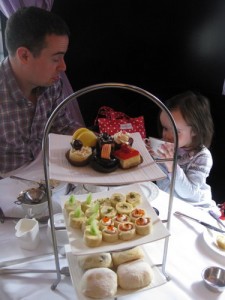 And then there was Friday. We had a reservation for 3 for tea at the Windsor Arms Hotel. Afternoon tea is my favourite thing in the world, but we haven’t taken Harriet since my birthday 2 years ago when she kind of ruined it for everyone. But she’s bigger now, and more importantly, our March Break had been excellent training in dining out. And she was an absolute star. Staff looked a bit dubious when we confirmed that Harriet would be having her own tea, that we wouldn’t have her “nibble off our plates” as they advised. And we’re glad we didn’t, because then we wouldn’t have been able to eat anything. Harriet had her own pot of apple-mango tea, discovered that she LOVED tiny sandwiches (and even cucumbers), and was an absolutely delightful afternoon tea companion, consenting to have tiny cakes cut into three so we could all have a taste of each. The scones were wonderful, I was so so proud of Harriet, and we all three had a very good time. I think we might keep this kid around
And then there was Friday. We had a reservation for 3 for tea at the Windsor Arms Hotel. Afternoon tea is my favourite thing in the world, but we haven’t taken Harriet since my birthday 2 years ago when she kind of ruined it for everyone. But she’s bigger now, and more importantly, our March Break had been excellent training in dining out. And she was an absolute star. Staff looked a bit dubious when we confirmed that Harriet would be having her own tea, that we wouldn’t have her “nibble off our plates” as they advised. And we’re glad we didn’t, because then we wouldn’t have been able to eat anything. Harriet had her own pot of apple-mango tea, discovered that she LOVED tiny sandwiches (and even cucumbers), and was an absolutely delightful afternoon tea companion, consenting to have tiny cakes cut into three so we could all have a taste of each. The scones were wonderful, I was so so proud of Harriet, and we all three had a very good time. I think we might keep this kid around
March 14, 2013
Fake books and orange books
 I am a little too excited about my latest blog post at 49th Shelf, which is a list of Fictitious Can-Lit: The Books that Never Were. I’ve made a list of fictitious books mentioned in several Canadian novels, cribbed book descriptions, and Stuart created book covers to accompany each one. Check out the post, and see how many of these books-in-books you’re familiar with.
I am a little too excited about my latest blog post at 49th Shelf, which is a list of Fictitious Can-Lit: The Books that Never Were. I’ve made a list of fictitious books mentioned in several Canadian novels, cribbed book descriptions, and Stuart created book covers to accompany each one. Check out the post, and see how many of these books-in-books you’re familiar with.
I’m also very excited about the Orange Prize longlist. I rarely read books based upon such nominations but I am also happy to have my own tastes confirmed when the books I’ve read already turn up on these lists. And with the Orange Prize, which is of course Orange no longer, but alas, my own tastes are confirmed more than with any other award. I haven’t read Kate Atkinson’s new one yet (I have pre-ordered it from my local, and waiting for the release day. New Kate Atkinson is an event, you see…), but am glad to see it there. And I have read Gillian Flynn’s Gone Girl, Barbara Kingsolver’s Flight Behaviour, Emily Perkins’ The Forrests, and Zadie Smith’s NW, and they were among my top reads of 2012. Though I’m rooting for The Forrests in particular, because it’s a book that deserves so much more attention.
March 13, 2013
Good things take place.
 I’m now reading Elizabeth Hay’s A Student of Weather, because it’s been sitting on my shelf for ages and because it’s mentioned in Isabel Huggan’s Belonging (and is blurbed by Huggan herself–I will read anything with Isabel Huggan’s name on it). I was leafing through it and was excited to see it contains a quotation from Jane Gardam’s Crusoe’s Daughter, everything seeming so circular because I read Gardam’s A Long Way From Verona on the weekend.
I’m now reading Elizabeth Hay’s A Student of Weather, because it’s been sitting on my shelf for ages and because it’s mentioned in Isabel Huggan’s Belonging (and is blurbed by Huggan herself–I will read anything with Isabel Huggan’s name on it). I was leafing through it and was excited to see it contains a quotation from Jane Gardam’s Crusoe’s Daughter, everything seeming so circular because I read Gardam’s A Long Way From Verona on the weekend.
I am not sure what it says about my intelligence (or, on the contrary, I know exactly what it says…) that Jane Gardam’s novels which are supposedly for young readers are those with which I’ve most appreciated. I’ve liked all her books, but they are all so strange. Or maybe what I mean is that Gardam throws her reader into the deep-end and one has no choice but to swim, swim, swim, and sometimes with all that frantic motion it is hard to really appreciate one’s surroundings. But I didn’t have to tread water as much with Bilgewater and A Long Way from Verona. These books also make it a bit easier to see what Gardam gets up to, and understand the other books–so much is withheld, truths aren’t necessarily so, narrators are unreliable.
Anyway, I loved A Long Way from Verona, though mostly for non-literary reasons. A few days ago, it occurred to me that there was an enormous chance that everything was going to be all right in terms of my health, and I’ve been feeling much better since then. And the end of the novel just underlined everything I’d been thinking, and hoping for (plus there is a postbox on the front cover of my copy). The last line is, “But like at the Novelty Machine, I just felt filled with love, knowing that good things take place.”
Indeed.
I was surprised to have a good night’s sleep last night, but I’m so glad I did, because the procedure was really not worth losing sleep for. I liked the surgeon who was really nice, and Stuart held my hand while he performed the biopsy (which apparently was totally disgusting, and I am sorry I didn’t get to see it. I always miss it when they pull things out of my body, and must rely on my husband for full reports). I do not have to wait for results, which is so good as it means we can enjoy the rest of our March Break week. I have an appointment to go back in two weeks to discuss results with the doctor, who told me that he thought the lump seemed pretty innocent. And I imagine that surgeons don’t say such things lightly. Sooner or later, and somehow, it seems that everything is going to be okay.
March 12, 2013
A Message for Vickie from Reality Bites, with information she’ll already have been made aware of if she’s had children of her own.
When I was fourteen, I wanted to be you. I wanted your bangs, your vintage clothing, your string of sexual partners, and friendship with Winona Ryder. I wanted every one of my words to be so laced with irony, to be that cool. You made me want to smoke.
But what I longed for most was your talent for disdain. “My mother,” you told your friend, Winona, while she was filming that documentary about you and your rumpled slacker peers, “goes to the bathroom with the door open.” And I knew exactly what you were talking about. It wasn’t even about doors and mothers and bathrooms, though these certainly stood for something concrete and disgusting, but instead, it was about an entire way of life, the kind of person neither you nor I ever wanted to be.
Vickie, I thought about this again years later, a few weeks before I turned thirty, which is a good half decade older than you’ve ever been. It was three days after the birth of my first child, born by caesarean-section due to her stubborn insistence upon lying sideways across my uterus. She was perfect, my daughter, pink and swaddled in a Perspex box, and I was already going to the bathroom with the door open. And oh, Vickie, that’s not even the half of it.
That I was going to the bathroom at all was a significant milestone, open door notwithstanding. It meant not only had they taken my catheter out (and yes, Vickie, motherhood is really this transcendental), but I’d walked the eleven steps to the bathroom by myself, even though my abdomen had been sliced in two just 36 hours before. I felt like a superwoman, until it came time to pull up my underwear; Vickie, I just couldn’t do it. To bend over so far in this strange new world had become anatomically impossible.
This was, of course, the official moment when the magic died. I had to call for my husband, who’d been gazing dreamily at our sleeping daughter, and summon him to my aid. He would come in to discover me sitting on the toilet, crying with embarrassment and pain. I needed him to pull up my underwear, which was not only a beige mesh hospital-issued pair, but had a diaper-sized sanitary napkin cradled in its crotch, soaked with the kind of blood that only comes post-partum. Dear Vickie, it’s like no period you’ve seen.
There was no mystery between us after that. How could there have been? And in the months that followed, when I got into the habit of going to the bathroom with the door open because if the door was closed, my daughter cried, I thought of you again Vickie, how I’d let us both down, but also of how much I hadn’t known about life and love when I was fourteen years, and you neither, even though you’d been so much older.
See, it was you, Vickie, all along. How you broke your mother, then resented the damage. Turns out it’s not marriage and habit that are passion-killers after all, but instead it’s children. And it turns out also, which is such a revelation, that your mother doesn’t care what you think.
Love, Kerry
